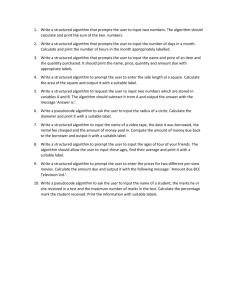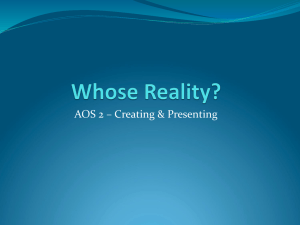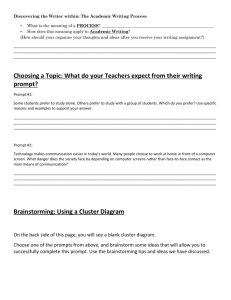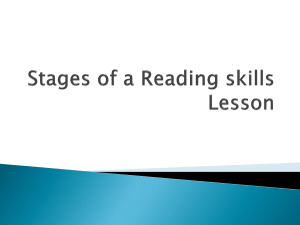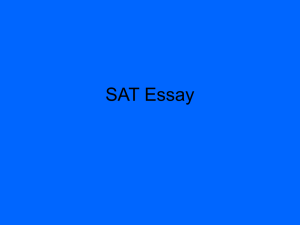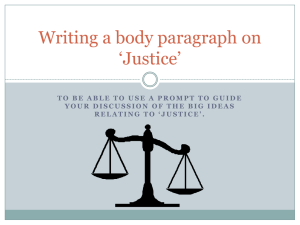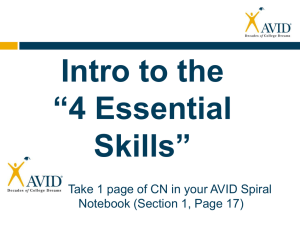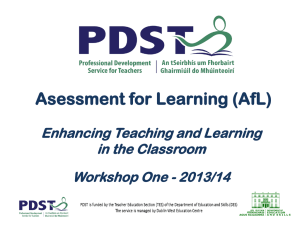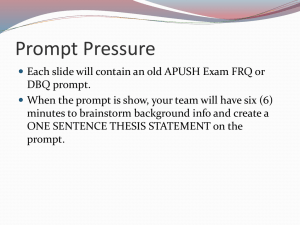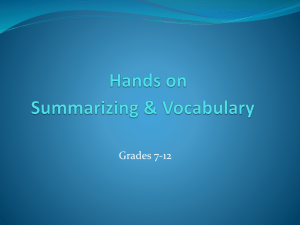Whose Reality? - Year 12 English
advertisement
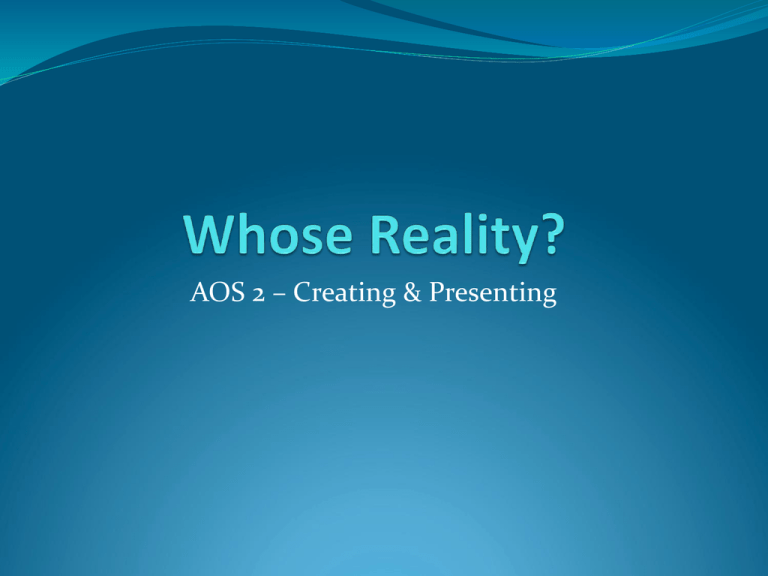
AOS 2 – Creating & Presenting Text Based Unit 3 – Spies Unit 4 – Streetcar Named Desire Exam – can refer to one or both texts. The prompt The prompt is usually quite generic (broad/general) so students can explore ideas from either text. You are required to deal with the CONCEPTS it raises. Previous Exam Prompts 2011 Exam - ‘Shared experience does not mean that people see things the same way.’ 2010 Exam - ‘Sometimes people find themselves living in a world created by other people.’ 2009 Exam - ‘We do not see things as they are. We see them as we are.’ 2008 Exam - ‘We can evade “reality” but we cannot avoid the consequences of doing so.’ The prompt Your piece should clearly address the prompt but does not have to provide a definite ‘answer’ or stick rigidly to the prompt. Shape your ideas around the prompt, using it as a starting point for wider discussion on the context . DO NOT write a generic or pre-prepared piece that is unrelated to the prompt. Assessing key ideas in prompts Highlight/underline the key words Look up any words in the dictionary you’re uncertain of Rephrase the prompt Consider the context ideas that are relevant to it How does this link to your chosen text? What’s your opinion on it? What texts, images, songs, quotes, theories spring to mind? Writing Requirements Expository Persuasive Creative/imaginative ‘Hybrid’ or combined form Texts Draw upon the ideas related to “A Streetcar Named Desire” by Tennessee Williams or “Spies” by Michael Frayne. You can draw on both if you want! DO NOT focus only on your selected text/s – these pieces tend to resemble text response essays and can only result in a mid-range mark of 4-7 out of a possible 10. Written Explanation You will have an opportunity to write a written explanation for your SACs This allows you to make the link between your piece and the prompt concrete You can be creative whilst you have this, experimental even You will NOT have an opportunity to write one in the exam Good writing? Dependent on the quality of your writing, the quality of your ideas and your ability to deal with the prompt. ‘There can be no good writing without good ideas.’ Sophisticated understanding of the context; sophisticated and clear expression. Be accurate and specific not general and vague. Assessors have found that the weakest responses are those that are too general and only ‘superficially’ explore key ideas. Whose Reality? Yours What is reality? Someone else’s Michael Frayne Multiple realities? Stephen Wheatley Emotional realities? Keith – mother, father Subjective reality? Tennessee Williams Objective reality? Blanche, Stella Real? Truth? Stanley, Mitch Unreal? Fake? Constructed realities Context ideas & statements Reality is hard to define. Reality can be harsh. There can be multiple realities/versions – sometimes these clash. We can consciously shape our reality – writing is reflexive and involves revising reality There are universal truths We all perceive reality differently – why? Our past experiences impact on our perceptions Significant people/events compel change Context ideas & statements We all (consciously/subconsciously) seek to avoid reality at times. We can only imagine what it’s like to ‘walk in someone else’s shoes’. The past affects the present. Our ability to perceive something clearly can be limited by our current mental state. Who’s to say what is real and what is not? There’s a fine line between illusion, madness, conception, deception, genius, madman. Context ideas & statements William Wordsworth – ‘The child is father to the man.’ The experiences we have as a child shape who we are as adults. Plato’s ‘cave allegory’ – Only those who truly question the world get to see it for what it is, not just ‘shadows on a wall’ (think ‘The Matrix’). We construct reality by reflecting on and editing events from the past – this involves value judgments. The brain shelters us from the harshness of reality by sustaining us with dreams and illusions – dangerous? Sample prompts 'The line between illusion and madness is a fine one.' 'When we attempt to make order out of chaos then we risk distorting reality.' 'Believing is seeing. The reality that we perceive is the reality that we want to perceive.' 'An experience becomes real when others feel what it felt like for you.' 'People's memories shape their understanding of themselves, their world and others.' Sample prompts cont… 'We can never attain a fully objective view of reality because we remain trapped in the prison of our subjectivity.' 'When competing realities clash the result can be only tragedy.' 'Our sanity depends on a clear understanding of what is and isn't real.' 'A person's self-image can interfere with their ability to perceive reality clearly.' Sample prompts cont… ‘There are no facts, only interpretations.’ ‘The truth means different things to different people.’ ‘People re-create their memories to suit their current reality.’
